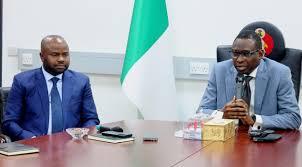The Federal Inland Revenue Service (FIRS) and the Economic and Financial Crimes Commission (EFCC) have renewed their pledge to work more closely together in order to strengthen Nigeria’s tax compliance framework and safeguard public revenue. The two agencies, which play critical roles in revenue generation and anti-corruption enforcement, say their cooperation will help build stronger financial stability and greater trust in the country’s revenue system.
The commitment was made during a courtesy visit by the Executive Chairman of FIRS, Dr. Zacch Adedeji, to the EFCC headquarters in Abuja on Tuesday. Dr. Adedeji stressed that Nigeria could not depend on chasing individual taxpayers but instead must rely on a system that encourages compliance and ensures that violators face clear consequences.
“We cannot pursue 200 million Nigerians individually to do the right thing, but we want to put a system in place that will aid compliance. You can help us by letting people know that when they violate the law, there is a place you can keep them. On behalf of the President and Nigerians, we thank you for your support and seek even deeper cooperation,” Adedeji told EFCC officials.
The FIRS boss explained that the most effective way to encourage Nigerians to voluntarily pay taxes is for them to see visible results from government spending. He described this as the “main advertisement” for compliance. According to him, Nigerians are more likely to willingly fulfil their tax obligations if they are convinced that their money is being used to provide infrastructure, public services, and social benefits that improve lives.
“The main advertisement of voluntary compliance is when people begin to see what we use the money we collect for. In achieving that goal, you are critical, not just in arresting defaulters but in supporting our Department of Fraud Risk, Assessment and Control to ensure value for money,” Adedeji said.
He further credited Nigeria’s recent success in meeting its national revenue targets to preventive strategies adopted by the FIRS as well as strong partnerships with key agencies such as the EFCC. According to him, revenue generation is not the work of one agency alone, but rather a collective effort that requires synergy among institutions tasked with protecting the economy.
Responding, the EFCC Chairman, Mr. Ola Olukoyede, assured the FIRS chairman of continuous collaboration between the two agencies. He welcomed the call for deeper cooperation and highlighted the role of the EFCC in investigating tax fraud, financial crimes, and revenue leakages that undermine Nigeria’s economic stability. Olukoyede added that the EFCC would continue to support the FIRS in its fraud risk assessment work while also ensuring that offenders are held accountable.
Analysts note that the renewed partnership comes at a time when Nigeria is struggling with revenue mobilisation challenges, rising public debt, and the urgent need to finance infrastructure, education, health, and social welfare programmes. Tax evasion and non-compliance remain widespread problems, with many businesses and individuals failing to meet their obligations, thereby putting pressure on government finances.
Observers believe that closer ties between the FIRS and EFCC could help close loopholes, deter tax cheats, and promote a culture of accountability. The partnership also sends a strong message to Nigerians that tax evasion is a serious offence that will be met with firm consequences.
The collaboration is also expected to strengthen the fight against corruption in revenue collection, ensuring that funds generated through taxes are not only collected efficiently but also safeguarded against misuse. Both agencies are also looking to deploy more preventive mechanisms and technology-driven systems that reduce opportunities for fraud.
By working together, the FIRS and EFCC aim to boost Nigeria’s capacity to mobilise domestic revenue, reduce reliance on borrowing, and build a more transparent and sustainable economic framework.
